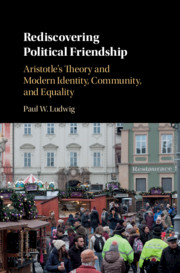Book contents
- Rediscovering Political Friendship
- Rediscovering Political Friendship
- Copyright page
- Dedication
- Epigraph
- Contents
- Preface and Acknowledgments
- Introduction
- Part I Foundations of Friendship
- Part II Where Is Civic Friendship Today?
- Part III A Different Way to View Liberalism
- 5 From Communitarianism to Civic Friendship
- 6 Commercial Society and Civic Friendship
- 7 Mass Society and Civic Friendship
- Part IV Conclusion
- Works Cited
- Index
7 - Mass Society and Civic Friendship
The Basic Agreement That Citizens Cherish
from Part III - A Different Way to View Liberalism
Published online by Cambridge University Press: 12 December 2019
- Rediscovering Political Friendship
- Rediscovering Political Friendship
- Copyright page
- Dedication
- Epigraph
- Contents
- Preface and Acknowledgments
- Introduction
- Part I Foundations of Friendship
- Part II Where Is Civic Friendship Today?
- Part III A Different Way to View Liberalism
- 5 From Communitarianism to Civic Friendship
- 6 Commercial Society and Civic Friendship
- 7 Mass Society and Civic Friendship
- Part IV Conclusion
- Works Cited
- Index
Summary
Citizens are civic friends when they agree about the regime, their political system. In liberal democracies there is agreement about the regime, or at least about its presuppositions: freedom and equality. This insight is simple but profound because regimes are self-perpetuating: they mold citizens into a recognizable type, such as the type that loves freedom and equality. Citizens tend to like this type of person—the type they themselves belong to. A “thin” agreement is the core of Aristotle’s teaching on civic friendship. For his immediate audience, he wanted more. Although his best-practicable regime leaves out many features of his best regime, civic friendship is a critical feature. Civic friendship has been transformed by federalism, by modern communications, more recently by the internet and social media. But “the Greek polis was small enough for everyone to be friends” is a modern mistake forgetting that civic friendship is an analogy. We cannot have many friends, Aristotle says, “except in the civic sense.”
Keywords
- Type
- Chapter
- Information
- Rediscovering Political FriendshipAristotle's Theory and Modern Identity, Community, and Equality, pp. 253 - 294Publisher: Cambridge University PressPrint publication year: 2020

